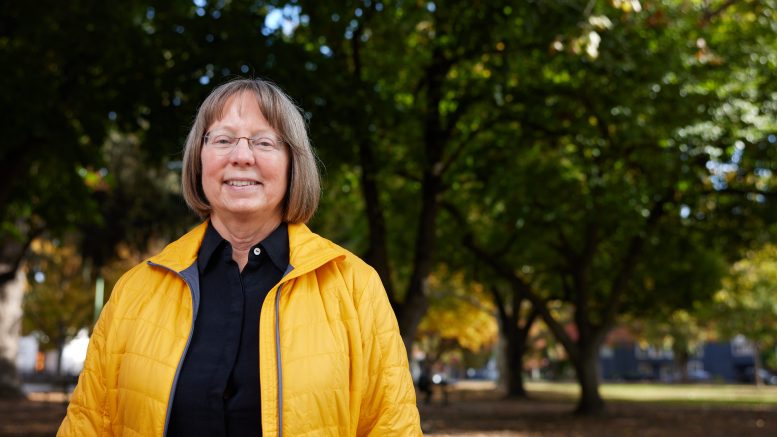By Ken Magri
Diane Luther has an extensive background in affordable housing policy and development in Sacramento and Oregon. That includes over two decades of experience in both nonprofit and government work.
She was the executive director of Northwest Housing Alternatives, a nonprofit organization dedicated to developing affordable housing across Oregon. One of the projects she was involved with won a national Housing and Urban Development award; the Rosemont Commons is a 165-unit, 7.5 acre redevelopment project in Portland.
While working as assistant director at the Sacramento Redevelopment and Housing Agency until 2010, Luther teamed up with Mercy Housing and the Sacramento Municipal Utility District to spearhead the 7th & H Street project, a 150-unit apartment complex for low and extremely low income residents, which opened in 2013. Situated near retail shopping and mass transit, the eight-story building includes social services and a health clinic on the ground floor. The project won the Leadership in Energy and Environmental Design’s “State of the Art” certification for environmentally sustainable housing.
Now a private housing consultant, Luther talked to us about the success of the 7th & H Street project, government and private involvement in the affordable housing industry, and new ways to fund future building projects.
Tell me about the 7th & H Street project in Sacramento and who it serves?
The location was formerly a police station. We took that all out and built from scratch. A large portion of it is permanent supportive housing for extremely low income and homeless people.
Permanent supportive housing is directed at people with disabilities, including drug addictions, that are so disabled they cannot compete for housing. They need support. The housing needs to be very cheap and it needs to come with social support, like a manager or a case person who can make sure [residents] are getting medicine, or getting fed, getting their food stamps. It’s important not to think of homeless [people] as a monolith, like everyone of them has the same problem.
The rest of the units are general affordable housing that used government funds to write down the construction costs, charge lower rents and require that the tenants have low incomes. It is all affordable housing, but there are various levels of incomes, like for some people who have jobs. The blend of them makes it doable. The building is very green and now has a lot of services on site. There are common area spaces so that people can socialize. It’s also right on the light rail line.
The success comes from thoughtful design and on-site services that cater specifically to the residents?
Yes. It is more than just a place to stay. Each homeless person or household has to be dealt with individually, to see what their needs are and how they can get out of their situation.
Can successful projects like 7th & H Street be repeated in other locations?
We need thousands more affordable housing units in the Sacramento region. One thing that the area has — more than any other metro area in Northern California — is land. And whether it’s the city or county, the Sacramento area has done a lot to enable approvals and permitting. But the primary issue is always money. That involves getting money from the city, the state and any federal resources that are controlled by the state.
Are there any non-governmental organizations that will fund affordable housing projects?
Yes, they typically don’t have enough money to make a big difference, but will make contributions. The Chan Zuckerberg Initiative [Pricilla Chan and her husband, Meta Platforms CEO Mark Zuckerberg] established a big affordable housing organization, because they are responding to needs in the Bay Area. Facebook was bringing in all of these employees, and there was no housing.
For people who work in a city where they cannot afford to live, couldn’t the state government mandate more affordable living spaces in these more affluent locations?
The state is cracking down on cities that say they don’t want high-density housing in their jurisdiction, but need affordable housing and say, “Let’s build it over there, not over here.”
Every city has to create an annual housing element that provides for enough housing and the state tells them how much to provide for. In past years, the more affluent cities would put sites in their housing element that weren’t really for housing — just play the game to get around the policy. But the state is sending back those housing elements now, saying they have to do this right. It is requiring all jurisdictions to step up.
I understand another issue with developers is they feel certain environmental regulations need reform because they cause too many delays. Is that true and can it be fixed?
They’re right. CEQA [California Environmental Quality Act] is the one. It’s not really that common, but if you file a suit or a complaint, it can set a project back by a year. There have been [legislators] working on CEQA reform, like legislation that says if you are working on certain projects, you are exempt from CEQA.
Is there any other recent legislation on affordable housing?
The biggest legislative breakthrough that we just had was AB 2011 that enables affordable housing on commercial sites. There are redevelopment plans being developed for dead and dying malls. Sunrise Mall [in Citrus Heights] is one they are taking a look at. The plan includes commercial and medical offices and a lot of residential housing.
First, the county will adopt a plan and have a public comment period. Then they will try to recruit a developer who can build the housing. It helps if the county has some money to put on the table to attract a developer. They also want to get it rezoned.
So, it comes down to needing money again?
In terms of housing solutions, there is a bunch of money coming down from the state. But what we don’t have is a permanent source of funds that is ongoing and independent of the budget. The production of affordable housing is at the mercy of annual budget ups and downs. We need some kind of revenue source that is permanent.
One thing that’s been proposed is a real estate transfer tax. That is a small percentage levied when a property is sold. The State has a small one, which it could tweak for that purpose, considering that home sellers are currently making huge amounts of money when they sell.
Another idea I agree with is to eliminate the current subsidy [mortgage interest write-off] for second homes and use that money instead to support affordable housing.
This Q&A has been edited for length and clarity.
This story is part of the Solving Sacramento journalism collaborative. In 2023, we are focusing on finding solutions to the lack of affordable housing in the Sacramento region. Solving Sacramento is a project of the Local Media Foundation with support from the Solutions Journalism Network. Our partners include California Groundbreakers, Capital Public Radio, Outword, Russian America Media, Sacramento Business Journal, Sacramento News & Review, Sacramento Observer and Univision 19.







The housing crisis could be solved very simply by the Providing funds from the era program that were supposed to be given to these supportive groups and nonprofits to help support non profit groups to provide housing and amenities because they’re trusted worthy because they don’t have money interestsing gold and they should be taxing the richest of California’s Billionaires that feed on the The poor and allow the systematic default that has occurred there have been so many deaths because of thisFailure to deliver Kobe Bryant relief on time and deny claims that were supposed to be supported with the funds to keep their housing and they have now died on the streets literally died so nowWhere are we the program failed the state absorbed the money and did not give it to where it was supposed to go to so they need to give money to the organizations that are helping people that understand people’s needsAlso they need to take money and profits out ofReal estate and make it to where that the homeowner that is renting the place can only charge $300 more than the mortgage amount and that $300 goes into a fund that is for fixing and repairs to the property only there is no profitTo be had and holding your house above someone said that you know that housing is a number one priority in anybody’s life without that they have nothing they will be nothing they canNot have a family they cannot survive it is not right it is everybody’s given right from birth To homestead, have a piece of property or Land To call theirs where they can raise a family And it is not right that these billionaires are buying all the housing and charging people ridiculous amounts of money to stay in them when they need To take out the profit from housing market unless you’re selling your house there is no profit to rent it because that makes it very Shady and unfair. Housing should be a right should not be held over your someone’s head for a prthey should be able to work for that house to own that house through hard work labor or just a piece of property they can Called around without being harassed
Why can’t the nonprofit organizations join the county, city, state and federal funding sources and declare that the homeless in Sacramento County are “economic refugees”. They should pool all their resources to address housing all homeless people in the county who want help. How about working with the Governmental and nonprofit organizations who deal with setting up refugee camps and set one up for the county’s homeless population.
If the United Nations and other international organizations can set up refugee camps within days to house large displaced and homeless populations; why can’t local governments and nonprofits do the same? They do it in emergency situations when needed. The incremental band aid approach we continue to use has not and will not work. Building low-income housing for a limited number of people takes an incredible amount of time and resources. We can’t build our way out the homeless problem without a comprehensive approach, which includes temporary housing and building low-income housing.
How about the county locate appropriate acreage to handle the building of a refugee camp with all the necessary governmental and nonprofit organizations represented on sight to deal immediately with all problems homelessness entails. This approach can provide a safe and resourceful environment, which should include public transportation to get to Schools, job interviews and other needed social and health services.
I am sure with pooled resources a comprehensive approach is possible. It will provide a healthy and safe environment for our most vulnerable citizens and families.